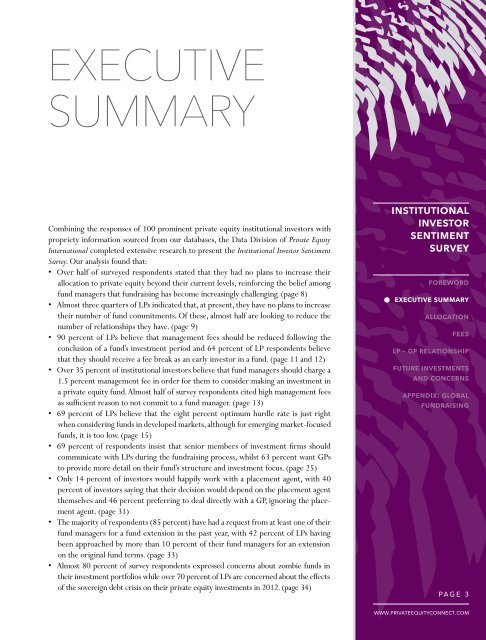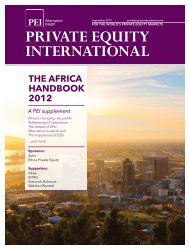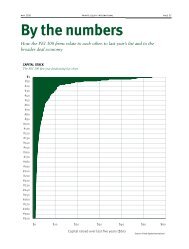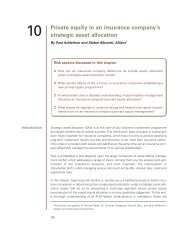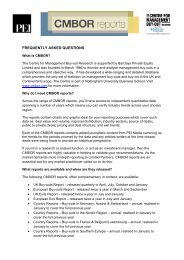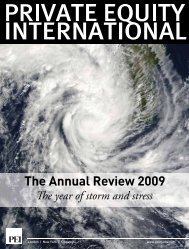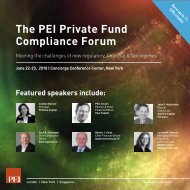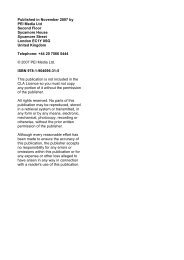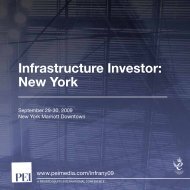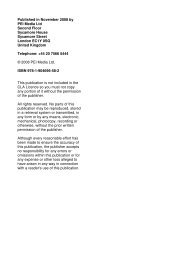INSTITUTIONAL INVESTOR SENTIMENT SURVEy - PEI Media
INSTITUTIONAL INVESTOR SENTIMENT SURVEy - PEI Media
INSTITUTIONAL INVESTOR SENTIMENT SURVEy - PEI Media
Create successful ePaper yourself
Turn your PDF publications into a flip-book with our unique Google optimized e-Paper software.
EXECUTIVE<br />
SUMMARY<br />
Combining the responses of 100 prominent private equity institutional investors with<br />
propriety information sourced from our databases, the Data Division of Private Equity<br />
International completed extensive research to present the Institutional Investor Sentiment<br />
Survey. Our analysis found that:<br />
• Over half of surveyed respondents stated that they had no plans to increase their<br />
allocation to private equity beyond their current levels, reinforcing the belief among<br />
fund managers that fundraising has become increasingly challenging. (page 8)<br />
• Almost three quarters of LPs indicated that, at present, they have no plans to increase<br />
their number of fund commitments. Of these, almost half are looking to reduce the<br />
number of relationships they have. (page 9)<br />
• 90 percent of LPs believe that management fees should be reduced following the<br />
conclusion of a fund’s investment period and 64 percent of LP respondents believe<br />
that they should receive a fee break as an early investor in a fund. (page 11 and 12)<br />
• Over 35 percent of institutional investors believe that fund managers should charge a<br />
1.5 percent management fee in order for them to consider making an investment in<br />
a private equity fund. Almost half of survey respondents cited high management fees<br />
as sufficient reason to not commit to a fund manager. (page 13)<br />
• 69 percent of LPs believe that the eight percent optimum hurdle rate is just right<br />
when considering funds in developed markets, although for emerging market-focused<br />
funds, it is too low. (page 15)<br />
• 69 percent of respondents insist that senior members of investment firms should<br />
communicate with LPs during the fundraising process, whilst 63 percent want GPs<br />
to provide more detail on their fund’s structure and investment focus. (page 25)<br />
• Only 14 percent of investors would happily work with a placement agent, with 40<br />
percent of investors saying that their decision would depend on the placement agent<br />
themselves and 46 percent preferring to deal directly with a GP, ignoring the placement<br />
agent. (page 31)<br />
• The majority of respondents (85 percent) have had a request from at least one of their<br />
fund managers for a fund extension in the past year, with 42 percent of LPs having<br />
been approached by more than 10 percent of their fund managers for an extension<br />
on the original fund terms. (page 33)<br />
• Almost 80 percent of survey respondents expressed concerns about zombie funds in<br />
their investment portfolios while over 70 percent of LPs are concerned about the effects<br />
of the sovereign debt crisis on their private equity investments in 2012. (page 34)<br />
institutional<br />
investor<br />
sentiment<br />
survey<br />
foreword<br />
• executive summary<br />
allocation<br />
fees<br />
lp – gp relationship<br />
future investments<br />
and concerns<br />
appendix: global<br />
fundraising<br />
page 3<br />
www.privateequityconnect.com


